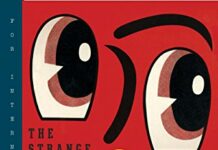
Ebook Info
- Published: 2010
- Number of pages: 626 pages
- Format: EPUB
- File Size: 2.41 MB
- Authors: Haruki Murakami
Description
A “dreamlike and compelling” tour de force (Chicago Tribune)—an astonishingly imaginative detective story, an account of a disintegrating marriage, and an excavation of the buried secrets from Japan’s forgotten campaign in Manchuria during World War II. In a Tokyo suburb, a young man named Toru Okada searches for his wife’s missing cat—and then for his wife as well—in a netherworld beneath the city’s placid surface. As these searches intersect, he encounters a bizarre group of allies and antagonists. Gripping, prophetic, and suffused with comedy and menace, this is one of Haruki Murakami’s most acclaimed and beloved novels.
User’s Reviews
Reviews from Amazon users which were colected at the time this book was published on the website:
⭐I remember reading somewhere that Haruki Murakami’s books are among the most-stolen from bookstores. I’m not sure why that is, but there’s no denying that the Japanese author has very devoted fans. Reading The Wind-Up Bird Chronicle was my first experience with him, and left me both sort of getting it and sort of not. It’s a hard story to describe: there’s a guy, Toru Okada, who lives outside of Tokyo with his wife, Kumiko, and their cat (which they’ve named Noboru Wataya, after her disliked brother) has gone missing. Toru has recently left his longtime job in a lawyer’s office, but is unemployed while he tries to figure out what’s next. Kumiko wants him to find the cat, and his searches for it lead him to strike up an acquaintance with a strange teenage girl, May, who lives down the block. That’s when the phone calls start.First, there’s a woman who says she knows who he is and starts talking dirty to him. But then there’s a psychic, a woman named Malta Kano, who explains that Kumiko has reached out to her to help with locating the cat. Kumiko and her family believe in things like psychics, having previously arranged for Kumiko and Toru to spend time with an old man called Mr. Honda, allegedly for spiritual consultations…but all that actually happens is that he repeatedly tells them about his experiences as a soldier in Manchuria during World War II. Toru meets with Malta Kano, and her sister, Cresta, but before long Kumiko herself disappears. She sends Toru a letter explaining that she’s left him for a coworker with whom she’s been having an affair, but he doesn’t believe this and decides to try to find her, which brings him into contact with even more strange people, including a mother and son who he calls Nutmeg and Cinnamon. And appearing throughout is the sound of a bird, that sounds like something mechanical being wound.This is a weird book, and I’m not sure I entirely understand it. It’s one of those that you finish and almost want to flip right back to the beginning and start again, to see if it makes any more sense the second time through. I think there will be a second time through, though certainly not now. And there will definitely be more Murakami. If I had to chose a single word to describe it, it would be “dream-like”. The way Murakami uses language and builds the world of the book create a feeling of constant loose connection, almost a structured free association, in which the concept that would tie everything together is just tantalizingly out of reach. It works well, and I found myself turning the pages and getting drawn further and further into it, though I suspected (correctly) that not everything was going to be tied up in a neat bow by the end.Honestly, though, once I finished it, though I felt like I liked it, I have had a hard time articulating exactly why. It was obtuse, the female characters were largely underdeveloped (though I did love May), and it felt like some storylines were just dropped like hot potatoes. But despite its flaws, it’s strangely compelling. There’s something magical and mysterious about the world as Murakami creates it, and it did get me thinking about some of the deeper themes that were explored, like our obligations to each other as people and the nature of power in relationships. It’s intellectually engaging despite the kind of haziness about it. If you’re ready for something non-traditional, I would recommend this book.
⭐If I had to sum this book up with one sentence, I’d say this:Nothing, is as it seems.Toru Okada is a normal guy. But when his cat goes missing, and then his wife Kumiko follows shortly thereafter, what at first seems normal suddenly becomes surreal and odd. So odd, that Toru apends time in an abandoned well to sort it all out.In the mean time, he meets a cast of very strange characters: *May Kasahara – a young neighbor girl who thinks about death a lot. She has a very matter-of-fact way of talking and acts as a sounding board for Toru. *Noboru Wataya – the brother of Kumiko. Toru cannot stand him as his political ideals differ from his. He’s also a bully when it comes to his sister Kumiko. The lost cat is also named after him, which is odd in and of itself given that Kumiko and Toru really do not like the guy. *Lieutenant Mamiya – an officer who witnessed the brutal death of a another officer. He is scarred over that event and has spent his own time down in a well. He has been tasked with carrying out a request in a will which is what brings him to Toru. *Malta Kano – acts as a medium. Kumiko hires her to help them find their cat. She sees things, but she’s not all that clear when she translates it to those who need the information. *Creta Kano – Creta is Malta’s sister. She too, has a talent but her talent is unpracticed and involves inhabiting people’s minds. She is also called a “prostitute of the mind” and gets to know Toru quite well. *Nutmeg Akasaka – the businesswoman who first sees Toru while observing people in the city. She is attracted to the blueblack mark on his face. A mark that her father also bore many years ago. Later, she makes him a proposition that he finds hard to refuse. *Cinammon Akasaka – the son of Nutmeg. He does not speak but uses a strange form of sign language to communicate. He carries out the wishes of his mother but is exceptionally good at what he does and what he does involves looking out for Toru on many levels. *The Wind-Up Bird – a bird that only certain characters hear. This bird makes a screeching noise and when Toru hears it, he is immediately reminded of a spring and how it needs to be wound in order to keep the world going. If you pay attention while reading, the appearance of the bird can clue you in to what is going on at that point in time.There isn’t a right or wrong way to describe this book. The story is simple, but the things that happen within the story beg to be discussed. The personalities of the characters, their history and how they all play their own part in the story is what makes a Murakami book an “experience” more than just a good read. It’s walks a crazy fine line between what’s normal and what’s not and throws in bits and pieces to shake you up and to jolt you back into reality, or what you think is reality. It’s the type of book that will have you asking questions for days, but somehow Murakami manages to bring it all together by those last few pages. Not to say that your questions have been fully answered. No, can’t say that. But I can say that as a reader, I was satisfied when I turned that last page.Murakami’s writing is very accessible and simple to follow. Most first-time readers feel intimidated by what they’ve heard about him, but the writing is not complex. The meaning behind what is written though, can boggle the mind, but not in a bad way. His books have a palate cleansing effect which I find very pleasing. He challenges you to think outside of the box and if you give in to it, usually you’re rewarded with a positive reading experience. Usually. There are those that are completely turned off by the oddness of it, and I understand that too. Murakami is not for everyone but what a reading experience it is!Reading this book was like taking two Benadryls, drinking a couple glasses of wine and then having one heck of a strange dream afterward. You wake, but you don’t wake and you sort of like it that way.As with his other novels, this book shares many of the same themes but mostly alienation and loneliness. There are some graphic depictions of sex and rape but not as much as some of his other novels. There is also a particularly gruesome act of violence but it’s brief and not drawn out so I found it tolerable although some of the other readers in the read-along found it hard to read.Compared to his other books, The Wind-Up Bird Chronicle is probably one of my favorites. It’s right up there with Kafka on the Shore but I found it much easier to follow than Kafka. It’s long. Over 600 pages long but much of it reads very quickly. In the six weeks that we had to finish the book, I think most finished well before the deadline. However, it was maybe 50 pages too long. I understand that two chapters were removed from the English translation and that they had to do with Toru’s relationship with Creta. I know it would have made the book longer but I wish I had those chapters now.If you are intrigued and want to give it a try, do so with an open mind and give yourself plenty of time to absorb what you’ve read. It also doesn’t hurt to take a week or two when done to just ponder the story. I found it very hard to focus on other books after finishing Wind-Up.
⭐This is the second book I’ve read by the author, the other being Norwegian Wood. Already knowing this novel would be much different to that, I was nonetheless pleased by the first few chapters and I was excited to see where the story was going. The escapism, abstract ideas and sense of isolation from the narrator’s point of view are profound.Unfortunately, things take more and more of a detached turn the further I read, and while I find Japanese history interesting and didn’t dislike reading about Manchuria, it didn’t really have much to do with the main plot. There are too many twisters and random, separate threads which are not really tied together. I found the ending especially unsatisfactory, for me there was no real sense of achievement or closure for the narrator and this is something I always find frustrating. It left me wanting more from the actual story.I wouldn’t say I disliked it, and it was an interesting journey but I doubt I would read it again. The style of writing is great and it hasn’t put me off pursuing reading other novels by Murakami.
⭐This was the second book by H.Murakami I ever read, and easily my favourite. Discovered his books in a dusty Japanese High School library, built up at the top of the school overlooking mountains, rivers and rice fields on both sides. This story really brought it home to me that I was living in Japan, and made me a part of it.His male protagonists tend to all be a bit similar. 30 something year old men in various states of troubled marriage/ divorce. But no other tale by Murakami centers the protagonist in the center of a universe where he can do nothing to rescue his fellow characters, except stay where he is, listen to their stories and endure.Rare story by a rare author.
⭐I love Murakami, I love his writing style; I love the rides he takes you on in his stories and how weird and wonderful they become.But then you have this book… has the usual weirdness, beautiful writing, etc. But it feels dead throughout. Fair enough the main character is supposed to be a VERY normal/uninteresting guy thrown in to a world of madness, but it lacked excitement and genuine entertainment. Maybe it’s supposed to make you feel this way since the narrator is the main character, but the only thing that got me through this book was the fact that I’m a Murakami fan, it took a lot of patience to plow through. Even reaching the end felt unsatisfactory, disappointing and kind of a waste of time. I’m sure there is a very intelligent reason behind why he goes through Manchuria and other topics, but it failed to interest me to the point where I was speed reading.So read this book if you are looking for something different or if you want to get through the Murakami series, but I wouldn’t recommend this for entertainment.
⭐Loved this book.If you ask me what it’s about I’m not entirely sure.As with all his books I always come away feeling it’s touched me, that I’ve learned something and that I’m a better person for having read it. Although I’m not always sure why.Good characters and the book trots a long at a good pace.Will buy moreIt’s a great read.
⭐This is a terrific book (I love Murakami so may be biased) I was glued to this from start to finish. My only criticism (and this applies to most of the English translations on offer) is that they are American English and not British English – this jars at times – bizarrely when I have read British English translations of Murakami they feel more Japanese!
Keywords
Free Download The Wind-Up Bird Chronicle: A Novel (Vintage International) in EPUB format
The Wind-Up Bird Chronicle: A Novel (Vintage International) EPUB Free Download
Download The Wind-Up Bird Chronicle: A Novel (Vintage International) 2010 EPUB Free
The Wind-Up Bird Chronicle: A Novel (Vintage International) 2010 EPUB Free Download
Download The Wind-Up Bird Chronicle: A Novel (Vintage International) EPUB
Free Download Ebook The Wind-Up Bird Chronicle: A Novel (Vintage International)





